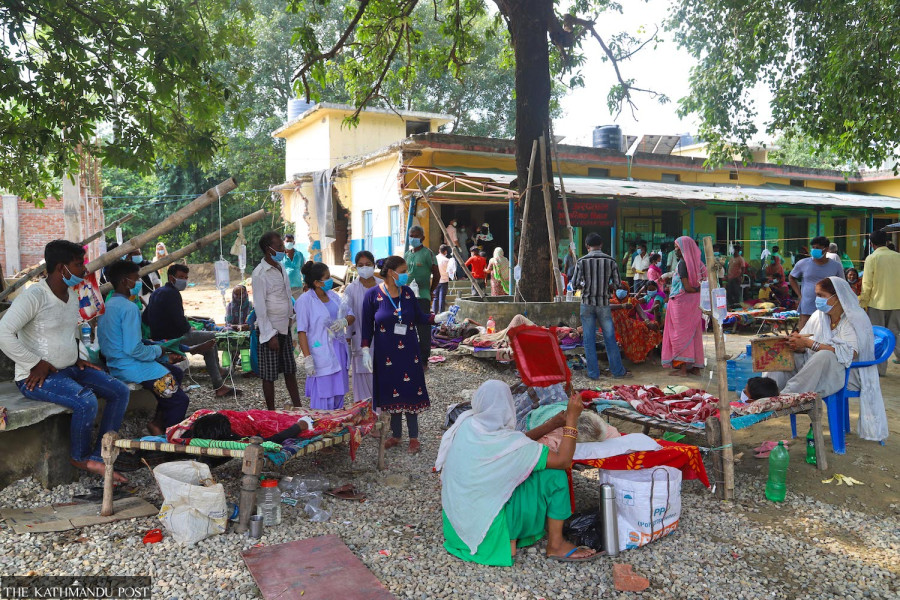Health
Samples from Kapilvastu villages brought to Kathmandu for tests
Two people have died of a diarrhoea-like outbreak that started on Monday night. Doctors suspect cholera, which the local laboratory failed to confirm.
Arjun Poudel
Samples of drinking water and stools of the infected people from wards 7, 8 and 9 of Krishnanagar Municipality in Kapilvastu district that have been hit by a diarrhoea-like outbreak were sent to Kathmandu for tests on Thursday after the Lumbini Provincial Hospital could not diagnose the disease.
The samples will be tested in the National Public Health Laboratory and results are expected to come on Friday, officials said.
“We have sent the samples to Kathmandu by air,” Dr Bikash Devkota, secretary for the provincial Ministry of Health and Population, told the Post over the phone from Butwal. “Although the symptoms in patients are similar to cholera, the laboratory of the provincial hospital could not confirm the disease, so the samples are being tested at the Kathmandu lab.”
Since the outbreak started on Monday night, at least two people including a seven-year-old have died and 370 others were infected as of Thursday morning in the municipality. Officials at the municipality said that 32 patients, whose health conditions are serious, have been referred to Butwal and other cities for further treatment.
“The number of diarrheal patients has been increasing every hour,” Shankar Bhattarai, health coordinator of the municipality, told the Post, over the phone from Kapilvastu.. “Situation has not yet come under control in the disease-hit villages.”
Schools in the areas have been shut as a lot of children have been infected, according to secretary Devkota.
Cholera is an highly infectious disease that causes severe diarrhoea and vomiting, which causes dehydration and can lead to death within a few hours if left untreated.
Both the victims died at their homes before reaching the health facilities, according to Bhattarai.
As the number of patients has been rising and the 15-bed local hospital overwhelmed, doctors are treating the patients on hospital grounds, under tents and at two schools, according to Raj Kishor Yadav, chairman of ward 7.
“We have launched a door-to-door campaign to make people aware of diarrhoeal diseases and urged them to boil water before drinking and maintain proper sanitation and hygiene,” said Yadav.
Cholera remains a problem in poor countries, which lack safe drinking water and proper sanitation infrastructures.
Nepal is also a cholera endemic country as cases of infection of the deadly disease are detected every year. The disease also continues to be reported in Kathmandu Valley.
Doctors say poor sanitation and contaminated drinking water are the main factors for a cholera outbreak.
Authorities in the municipality suspected that contaminated water was responsible for the outbreak. “In more than three places, drinking water mains have been damaged by the heavy machinery used in the construction of Postal Highway,” said Yadav. “People in the villages also drink water from tube wells, which could be contaminated.”
Although the municipality was declared an open defecation free zone some two years ago, people still defecate in the open.
Every household has toilets, but only around a half of them are in use,” said Yadav.
The Ministry of Health and Population in Lumbini said it has dispatched a sufficient number of health workers and medicines to the disease-hit villages of Krishnanagar Municipality.
“We have deployed a consultant doctor and health workers from the provincial hospital,” Devkota, the provincial health secretary, told the Post. “We have been coordinating with Health Ministry officials in Kathmandu.”
Devkota, who earlier served as spokesperson for the Health Ministry, also suspected that contaminated water is responsible for the outbreak he believes is cholera. Most of the symptoms in the patients suggest cholera, he said.
Doctors say that changing people’s habits is not as easy as constructing toilets or declaring open defecation free zones.
“Sources of cholera still exist in the country,” said Dr Sher Bahadur Pun, chief of Clinical Research Unit at Sukraraj Tropical and Infectious Disease Hospital. “Outbreaks of cholera or other diarrheal diseases occur every year due to poor sanitation conditions.”
Experts say along with improving sanitation infrastructures, authorities should also invest in awareness campaigns.
“Cholera is a deadly disease but treatable. It should not be taken lightly,” said Pun. “We know what is the problem and what is the solution. By avoiding contaminated foods and water, we can avoid the infection.”
The World Health Organisation says that cholera remains a global threat to public health and an indicator of inequality and lack of social development. The UN health agency said that a multifaceted approach is key to controlling cholera and reducing deaths.
A combination of surveillance, water, sanitation and hygiene, social mobilisation, treatment and oral cholera vaccine are required to contain the spread of the infection.
Last year cholera cases were not reported and doctors attributed that to the increased hand-washing that people practised to avoid the Covid-19 infection.
Meanwhile, the Ministry of Health and Population said that three officials including a representative from the World Health Organisation Nepal have been sent to Kapilvastu.
“They have already left for the disease-hit areas,” Dr Samir Kumar Adhikari, joint spokesperson for the Health Ministry, told the Post. “We are in close contact with the respective local units and agencies of the provincial government.”




 22.12°C Kathmandu
22.12°C Kathmandu















